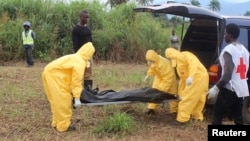The Australian government said Wednesday it will commit up to $17.4 million to fund a 100-bed Ebola treatment center being built by the United Kingdom in Sierra Leone.
While Australia will not send emergency teams to virus-affected parts of West Africa, it will pay a private health company to staff the clinic, Australian Prime Minister Tony Abbott said.
Australia has previously refused to send workers to tackle an epidemic that has killed about 5,000 people in Sierra Leone, Guinea and Liberia. It is the worst outbreak of the disease since it was identified in 1976.
Abbott had said it was too dangerous to deploy health teams because there were no plans in place to properly treat them should they become infected with Ebola. However, he now said a deal has been reached with Britain to treat any Australian working in West Africa who becomes infected.
"We have been particularly concerned that any Australian personnel going to West Africa should be able to access appropriate treatment and evacuation procedures," the prime minister said. "In the last few days, we have had assurances from the United Kingdom that they would treat any Australian who is working in the Ebola-impacted parts of West Africa as though he or she were a citizen of the United Kingdom.”
Move applauded
Charities and health groups have welcomed the government’s decision to boost its efforts to fight Ebola. Australia had previously donated $15.7 million to help the international response in West Africa.
Medecins Sans Frontieres, UNICEF and the Australian Medical Association said Canberra’s announcement Wednesday to help staff a clinic in Sierra Leone was a breakthrough.
Paul Ronalds, the Australian chief executive of Save the Children, said it is a much-needed development.
“We've been increasingly concerned about the continued rapid deterioration, particularly in Sierra Leone and this facility is really desperately needed," Ronalds said.
There have been no confirmed cases of Ebola in Australia.
Last week, Australia became the first developed nation to issue a blanket ban on visas from the three most Ebola-affected countries - Sierra Leone, Guinea and Liberia - sparking widespread criticism, Reuters reported..
Also Wednesday, the World Bank President Jim Yong Kim on Wednesday reported mixed progress in the fight against the deadly Ebola virus in West Africa, pointing to encouraging signs in Liberia and a more worrisome trend in neighboring Sierra Leone.
“There's some good news coming out of Liberia in terms of reduced number of cases, at least coming to the hospitals,” Kim told Reuters in an interview on Wednesday in Seoul.
“But then there is more concerning news coming out of Sierra Leone, where regions that were thought to be under control have now seen a surge in cases, and this is what we see with Ebola - we see drops and then we see surges,” he said.
Some material for this report came from Reuters.




